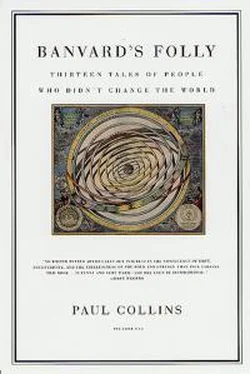Even so, Samuel's incessant demands for more papers were exhausting William, as were the constant pleas to meet with Mr. H. Since Mr. H. had such sway over his father, William began to address letters from him to his father. They were replete with praise for his brilliant son's poetic gifts and deeply ironic comparisons to Shakespeare:
... I would not scruple giving l2000 a year to have a son with such extraordinary facilities. If at twenty he can write so what will he do hereafter. The more I see of him the more I am amazed. If your son is not a second Shakespeare I am not a man ... Your son is brother in genius to Shakespeare. He is the only man that ever walked with him hand in hand.
William would watch his father's face for any sign of agreement. But Samuel didn't want to hear about paying William more attention and a greater allowance; he wanted Shakespeare papers. Exasperated, William made another bid for attention: he discovered a second trunk full of documents at the house of Mr. H. He rashly produced a list of the contents of this second trunk: complete manuscripts of Richard II and Henry V, partial manuscripts for six other plays, a new play titled Henry the Second, and--most incredibly--Shakespeare's autobiography.
William hatched schemes to ensure that the document windfall would continue far into the future. Hearing that the butcher living in Shakespeare's house in Stratford-on-Avon was selling it, William attempted to buy it. Had he succeeded, it would have presented infinite opportunity for new discoveries: under every floorboard, behind every fireplace brick, and over every rafter could be found a new sonnet, a secret love letter, an undiscovered play!
Unable to secure the house, William handily produced a Letter of Deed from Shakespeare recounting the heroic deeds of one ... William Henry Ireland.
There had indeed been a William Ireland in London in Shakespeare's day; only now, this Ireland became the young man who rescued Willy from drowning by diving into the Thames after him. In gratitude, Shakespeare had written a rider to his will bequeathing William Ireland the rights to eight plays--including Vortigern and Henry the Second.
Perhaps, William hinted to anyone who would listen, this other Ireland was a direct ancestor of his, and this was why Mr. H had chosen him as the recipient of the Shakespeare papers. An ancient will was now being honored, and William Henry Ireland--the dullard boy who never knew for sure who his mother was--was now the fabulously lucky descendant of a friend of William Shakespeare's.
Samuel Ireland was ready in December 1795 to present his lavish volume of transcriptions and facsimile plates, Miscellaneous Papers Under the Hand and Seal of William Shakespeare. William begged him not to publish it, but Samuel was not to be deterred--why, these were the papers of Shakespeare! How could he not publish them? And so William waited with growing dread, knowing that the flimsiness of his inventions would now be exposed for every scholar in Britain to pick apart, and not to simply glance at in the display case in his father's study.
He would be tested sooner than he thought. One day William strolled from Bingley's offices and back to his father's house for his midafternoon break.
When he arrived, he found the house in tumult.
--What's wrong? he asked.
Albany Wallis had just visited. Though he was Samuel's friend and lawyer and a neighbor on Norfolk Street, he had long been skeptical of the papers. Wallis informed Samuel that he had discovered a genuine old deed signed by John Heminge. Wallis presented Samuel with his document, and Samuel pulled the other out from the display case--the very one that William had affixed Heminge's name and signature to for his very first Shakespeare forgery. The two signatures looked nothing alike. William was horror-struck: he'd picked Heminge because he thought there were no extant signatures, and now his bluff was called.
--Let us go see it, he told his father.
At Wallis's office, the lawyer once again produced the deed. William stared it, memorizing its every curve and letter. Excusing himself from the chambers, and promising an explanation from Mr. H very shortly, he calmly left Wallis's building--and then ran back to Bingley's offices. He dashed out a receipt bearing the signature of Heminge, executed as best as he could remember it from Wallis's document, and then warmed it over the fire to age the special ink. He dashed back to Wallis's office with the new receipt in hand.
It was all a silly misunderstanding, William told him. Mr. H had explained everything: there were two John Heminges, one that worked with the Globe Theatre, and one that worked over at the Curtain Theatre. Shakespeare had done business with them both, and so had signatures from both in the papers.
See?--He handed him the receipt--I also have a signature from your Heminge!
Wallis examined the document and admitted that the proof was clear enough. He was sorry now that he had ever doubted the papers. William returned to Bingley's office, cranked out an improved copy of the first, and then returned to Wallis to let him look at the receipt more closely. The illusion was so perfect that Wallis didn't realize that he was looking at a different piece of paper from the one he'd stared at just minutes before.
William accomplished these forgeries in just over an hour--and that included walking back and forth between the offices. By four-thirty, the crisis was over and Wallis placated. This feat weighed much in William's favor. The papers had to be real if they could be produced on such short notice: it was inconceivable that anyone could forge that quickly and effortlessly.
Sheridan kept pushing the Vortigern premiere back, as if he was hoping to make the whole thing go away. By the time it would get staged, it would be after the publication of the Shakespeare papers, and after the inevitable attacks to follow. Samuel pleaded with Sheridan to speed up the premiere, but to no avail.
On Christmas Eve 1795, the London Times ran a notice that Miscellaneous Papers Under the Hand and Seal of William Shakespeare was now ready to be picked up at Samuel's house. London's literati stopped by Norfolk Street that day for their copy, delighted to have the Bard's personal letters to read by the Yule log. Other buyers were delighted for different reasons: they were sharpening their knives.
The first attack appeared days later in The Tomahawk: Ireland, Ireland, tell to me, "Who wrote Shakespeare's writings?"- THEE!
The following weeks did not bring much relief. The obvious target for ridicule was Ireland's bizarre spelling, and on January 14 a journalist at The Telegraph happily "discovered" another letter of Shakespeare's: TOOO MISSTEERREE BEENJAAMMIINNEE JOOHNNSSONN Deeree Sirree, Wille youe doee meee theee favvourree too dinnee wythee meee onnn Friddaye nextte attt twoo off theee clockee too eatee sommee muttonne choppes andd somme poottaattooeesse
I amm deerree sirree Yourre goo.e frien.e WILLIAME SHAEKSPARE
Other newspapers followed with parodies of Shakespeare's letters, and the January issue of the Monthly Mirror screamed, "THE WHOLE IS A GROSS AND
IMPUDENT IMPOSITION, AN INSULT TO THE CHARACTER OF OUR IMMORTAL BARD, AND A LIBEL ON THE TASTE AND UNDERSTANDING OF THE NATION!!" Editor James Boaden flayed the papers alive, amply demonstrating to readers the "vicious and fantastic orthography" of William's mock-Tudor spelling. And there was more: by January 20, it was whispered that the pugnacious lawyer and Shakespeare scholar Edward Malone had prepared a skewering of the papers. Malone was known as a devastating cross-examiner in the courtroom, and Samuel and William waited miserably the entire winter for his onslaught.
Rumblings came back to Samuel from Drury Lane that Sheridan was not exactly doing his utmost on behalf of the play. He was recycling as many old props and costumes as he could, while lead actor John Kemble ridiculed the dialogue during rehearsals, encouraging the cast to join in with him. Many did. Then, to top it off, Sheridan wickedly chose a premiere date of April 1, 1796--April Fool's Day. Samuel protested, and Sheridan barely relented. The premiere was set for the following evening, Saturday, April 2.
Читать дальше











